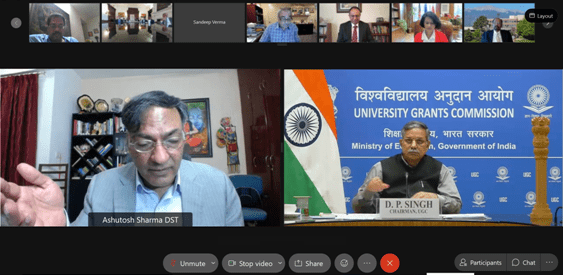Connecting Indian Academia, the U.S. Indian Diaspora and U.S. Universities
Professor Ashutosh Sharma, secretary, Department of Science and Technology (DST), stressed on the role of the Indian diaspora and the importance of the role they could play in connecting with Indian academia and Industry during his recent interaction with several Indian origin presidents of U.S.-based universities.
“Given the constraints and cultural differences in research ambience of two countries we can work through mutual collaborations with the help of government initiatives like VAJRA, SPARC and so on particularly in futuristic technologies like cyber-physical system, quantum, hydrogen, electric mobility in which several Indian scientists are also doing substantial work. The Ministry of S&T is determined to connect the Indian diaspora with the Indian researchers, and DST has had several dialogues with the National Science Foundation and the U.S. Department of Energy on the development of bilateral scientific cooperation,” said Prof. Sharma.
Sharma has been periodically interacting with Persons of Indian Origin (PIO) in Science, Technology, Engineering, Medicine, and Mathematics (STEMM).
On Aug. 20, he, along with Professor D.P. Singh, chairman, University Grants Commission, interacted with 11 Presidents/Chancellors of U.S. universities in which Taranjeet Singh Sandhu, India’s Ambassador in United States, also participated.
S.K. Varshney, Head, International Cooperation, DST, mentioned that the government is keen to nurture the connection of Indian diaspora to their roots. He pointed out that in STEMM areas, the first significant step was taken by organizing the VAIBHAV (Vaishwik Bharatiya Vaigyanik) summit in 2020, and now an online portal, PRABHASS (Pravasi Bharatiya Academic and Scientific Sampark), has also been launched to connect Indian diaspora with Indian academic and research institutes.
Prof. D.P. Singh, Chairman UGC, shared his insights on the new National Educational Policy and development since its announcement last year. He highlighted about the internationalization of the Indian education system and invited U.S. Universities to set up campuses in India.
During the interaction, Indian diaspora suggested that frequent actions need to be taken on collaborations along with a set timelines and defined focus areas. They proposed upgrading the healthcare system and promotion of medical sciences along with technical education so as to develop cooperation in certain focus areas like health care, artificial intelligence machine learning, agriculture, and so on.
The meeting was attended by Prof. Satish K. Tripathi, State University of New York, Buffalo; Prof. Pradeep Khosla, University of California, San Diego; Prof. Michael Rao, Virginia Commonwealth University; Prof. Kumble Subbaswamy, University of Massachusetts, Amherst; Prof. Ashish Vaidya, Northern Kentucky University; Prof. Renu Khator, University of Houston; Prof. Neeli Bendapudi, University of Louisville, Kentucky; Prof. Venkat Reddy, University of Colorado, Colorado Springs; Prof. Mauli Agrawal, University of Missouri, Kansas City; Prof. Mantosh Dewan, Upstate Medical University, SUNY; Prof. Mahesh Daas, Boston Architectural College, Boston.


